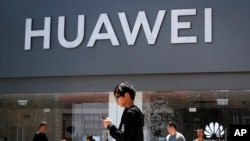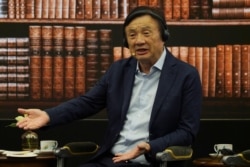The White House on Tuesday downplayed President Donald Trump's concession to allow sales of some computer chips to China's Huawei Technologies company, saying the telecommunications giant remains blocked because of national security concerns from buying parts to produce its newest 5G smartphones.
Trump trade adviser Peter Navarro told CNBC, "All we've done basically is to allow the sale of chips to Huawei and these are lower tech items, which do not impact national security whatsoever. Selling chips to Huawei, a small amount of chips - less than $1 billion a year - in the short run is small in the scheme of things."
Washington had put Huawei on an export blacklist in May, citing national security concerns related to its technology for the company's 5G – Fifth Generation – smart devices.
Huawei's founder Ren Zhengfei also said that Trump's agreement with Chinese President Xi Jinping over the weekend to relax a ban on U.S. sales to Huawei would not have "much impact" on the company's business. But Ren said he is willing to continue to buy U.S. products.
Trump and Xi agreed at their meeting in Japan on the sidelines of the G-20 economic summit to resume trade talks after a seven-week hiatus, with the U.S. leader saying he would not impose further tariffs on Chinese imports while the negotiations continue.
"We're headed in a very good direction," Navarro said. "It's complicated, as the president said, correctly, this will take time and we want to get it right. So let's get it right."
The world's two largest economies have intermittently talked trade for months while imposing higher tariffs on each other's products that are sent across the Pacific.
Both countries said in recent days they reached agreement on 90% of outstanding issues, but that an accord on the last 10% has proved daunting. Aside from U.S. sales of computer components to Huawei, there are other unresolved issues, including the U.S. demand that Beijing end its practice of requiring U.S. companies to turn over proprietary technology information, cyberattacks and Chinese government support for its companies.
After returning to Washington, Trump said the U.S. relationship with China "continues to be a very good one. The quality of the transaction is far more important to me than speed. I am in no hurry, but things look very good! There will be no reduction in the Tariffs currently being charged to China."






